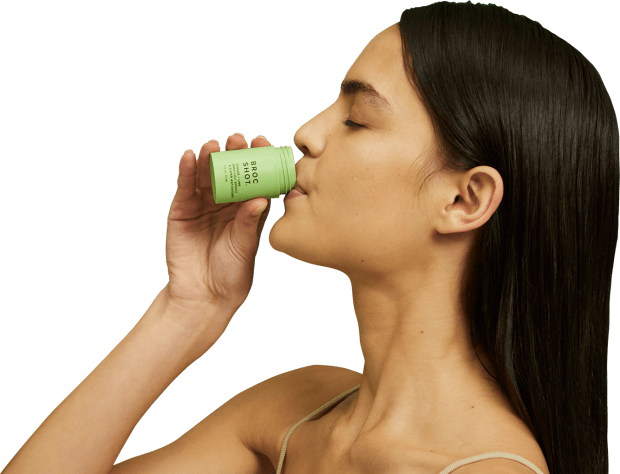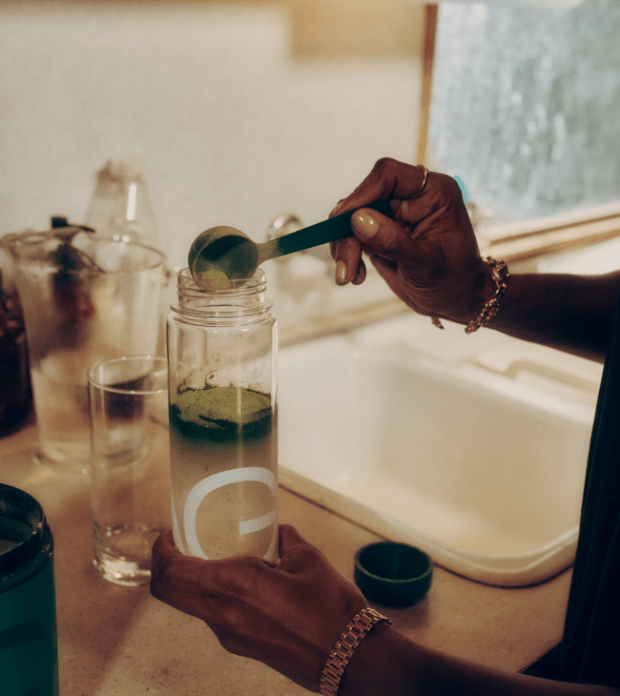How Greens Powders Became the Most Controversial Wellness Product on TikTok
An up-close look at the nutrition fad — and whether it's helpful, harmful or somewhere in between.
It's a Tuesday morning — 8:00 a.m., to be exact — and I've already thrown back a shot with the spirit of a college senior. Sounds problematic, I know, but what I took was a far cry from the mango Absolut of my university years. My newfound shot of choice? A health drink made from 100% whole broccoli sprouts. And, per the brand, it's bursting with health benefits, claiming to make skin look more radiant, reduce fatigue, level up focus and quell bloating. Vodka could never, but can a shot of vegetable powder and water really?
I'm referring to Broc Shot, a cold-pressed innovation that debuted in 2017, starring sulforaphane. How it works, supposedly, is that the antioxidant-rich compound "switches on" over "200 protective genes in your body," company co-founder Gracia Walker tells Fashionista, thus neutralizing toxins that contribute to various health problems. The ingredient boasts a bevy of peer-reviewed studies examining its treatment capabilities for a wide range of conditions, from constipation to cancer.
Unlike Broc Shot's lean ingredient list, traditional greens powders — from brands like Bloom Nutrition and Athletic Greens — feature upwards of 25 ingredients. But they're all among the hundreds of dietary supplements harnessing ingredients from fruits and vegetables, making up an arguably oversaturated, yet thriving, market. Greens powders brought in an estimated $288 million in the States in 2021, per Global Newswire, and experts predict sales will jump to a whopping $673 million by 2028.
Those stats aren't shocking, given that greens powders are booming on social media, where influencers herald them as the first step in their aesthetics-first wellness regimen. Countless content creators have posted iterations of the same video concept to TikTok, blending their greens into a glass of water to the tune of the app's most popular song of the moment. Others share drastic before-and-afters. They usually feature transformation photos: a bloated belly vs. a flat one (ab line and all), or acne breakouts vs. clear skin.

Photo: Courtesy of Broc Shot
This type of marketing is nothing new. "It's similar to how companies sell a weight-loss product that claims customers will drop 10 pounds just by using it," says Marissa Arnone, a registered dietitian nutritionist (RDN). For example: Claiming greens powders will help with chronic bloating "oversimplifies a complex physiological process" that "requires a lot of work over a long period of time."
As controversial as greens powder may be, people are undeniably interested in them. Just look at the numbers: The TikTok hashtag "greens powder" has nearly 150 million views and counting. It's evident that the mundane daily wellness ritual has taken on overwhelming cultural significance. And its social media domination is right on time, here to replace 2010's hair gummies as the most contentious influencer-driven product of the decade.
I was enamored, too — not by the testimonials or clips of powder and water homogenizing in cinematic fashion, but admittedly, the prospect of reducing bloating. While talking with Walker, her scientific spiel made my ears perk up because I've tried most methods claiming to be the solution to my gut woes (Peppermint capsules! Apple cider vinegar! Long walks! A casual upper endoscopy!) and have seen little to no improvement. So, weeks later, I felt some semblance of hope when I opened my fridge to three egg cartons' worth of Broc Shots, which ironically took up more space than my entire supply of veggies.
Standard greens powders aren't cheap, nor are Broc Shots. A 30-pack costs $130 (a little over $4 a shot), but on the bright side, the innovative packaging echoes the high price tag: Each shot comes in a recyclable bottle with a patented dosing cap that separates the active sulforaphane powder from the pre-measured portion of filtered water. To take it, you push down the cap, shake it (which activates the powder), and then toss it back. Admittedly, they have an earthy taste that I don't love (and Fashionista's beauty director couldn't stomach more than once), but again, I was in it for the benefits, not the flavor.
While millions of shoppers have purchased greens powders and shots and sung their praises, others have fiercely call BS. Many people have started to catch onto the fact that there's an obscene amount of paid marketing behind some of the biggest and buzziest companies, and it's difficult to determine the actual nutritional value of what you're consuming. Compounded with the fact that it's impossible to gauge authentic testimonials versus real ones, this is all a recipe for misinformation. So who's to trust?
Do greens powders work?
The answer to whether greens powders work or not isn't so black and white. While they may be helpful for those who struggle to eat the recommended four-to-five servings of fruits and vegetables per day, that doesn't make them a necessary daily wellness supplement — nor does it mean everyone will reap the same nutritional benefits.
Lana McCarthy, a registered and licensed dietitian, calculated that one scoop of a leading greens powder gives you about 15 grams of whole fruits and vegetables — just a small fraction of the recommended daily intake of 400 (!) grams. "To even get 10% of the bare minimum recommendation, you'd have to take three scoops of this a day, she says in a TikTok video about Bloom. Though the math is unconfirmed, this points to a bigger issue: that greens powder has earned a scientifically unsubstantiated reputation as a wellness hero.
There are very few greens powder studies, certainly not enough to support (or fully debunk) their widespread claims. A 2009 Journal of Chiropractic Medicine study found that taking BioPharma Nanogreens for 90 days reduced blood pressure among its 40 subjects. This paper is significant, but given the narrow breadth of greens powder studies, more research is crucial to provide a reason to invest your paycheck in powdered vegetables.
View the original article to see embedded media.
Even so, TikTok testimonials have been enough to sway consumers. Greens powders are hailed as a quick fix to systemic problems like acne and chronic bloating, with the aforementioned convincing before-and-afters. But they're not meant to be so transformative; their job is to "supplement the diet," not replace "vitamins, minerals, prebiotics, probiotics and phytonutrients that you would obtain naturally from whole food sources," explains Renee Korczak, an assistant teaching professor of food science and nutrition at the University of Minnesota.
Keep in mind that greens powders are stripped of some nutrients during processing, says Arnone. For example, unlike whole fruits and vegetables, "greens powders are virtually void of fiber," she says. "A big reason why eating more fruits and vegetables can help with bloating is due to their fiber content, so saying a greens powder helps with this doesn't quite add up."
Likewise, it's implausible that you'll see immediate results by taking them. "Just like with weight loss, you can't see results overnight or instantaneously after taking a product," Arnone continues. "The vitamins and minerals from fruits and veggies may improve inflammation in the body, which can help improve gut health, but it is a long-term process, if anything."
So if you're thinking: But TikTok! The before-and-after videos! Sorry, but these might not be as authentic as you'd like to believe. "These content creators get paid a lot of money to produce these ads, and the bloating claim is probably the biggest reason a greens powder sells on social media," says Arnone. "I've seen ads where creators push their hips forward and stick out their bellies to appear bloated."
Are greens powders safe?
There's nothing inherently unsafe about greens powders, but a lack of understanding regarding common marketing tactics and drug-nutrient interactions can put you in harm's way.
"Because greens powders are supplements, they can affect how your body metabolizes medications — even hormonal contraceptives," says Arnone. "Many greens powers contain rosehip, which can interact with birth control pills," she continues. Also, certain supplements might "increase the amount of a certain medication in the blood, which can cause more of the medication's side effects. Or, it can metabolize the medication faster," and thus render it less effective.

Photo: Courtesy of Athletic Greens
Another nutrient to be wary of is vitamin K, which many greens powders contain in high amounts. The bone-building ingredient can also "affect how blood thinners, cholesterol medications and some antibiotics are metabolized in the body," Arnone adds.
It also gets tricky when you don't know exactly how much of each ingredient you're ingesting. Enter the phrase "proprietary blend," a marketing term slapped on the side of many greens powders that may sound impressive, but is, in practice, entirely vague. It's intended to protect the brand's formulations from being replicated, but it also means the company can withhold specific ingredient quantities. Unless a brand is exceptionally transparent, it can be hard to know if you're getting an effective amount.
Brands get away with withholding this information because greens powders are considered a supplement, which means they're not regulated by the Federal Drug Administration (FDA). All of this means that researching your prospective greens powder's safety and legitimacy is entirely up to your discretion. It's no easy feat, but the good news is that plenty of resources exist to make an educated decision. A good rule of thumb is to choose brands that utilize third-party testing (to ensure the product contains what it's supposed to and that it's not contaminated) and don't hide behind "proprietary blends" — ingredient quantities shouldn't be a secret.
Are greens powders worth it?
Greens powders are worth it if they're your only option, but that's rarely the case in this multimillion-dollar industry. The reality is that those who need them typically can't afford them. Marianna Moore, cohost of the podcast "Fitness Stuff (for normal people)," explains in episode eight that they're best for those "who don't have financial access" or who face a barrier to getting their hands on whole fruits and vegetables. In other words: A $40+ bottle of greens powder is unattainable for those who might get the most benefit.
And if you're taking it to try and solve a health problem, that's probably a lose-lose. All experts interviewed for this piece noted that speaking with your healthcare provider before starting a supplement is vital. And while this is easy to overlook, it's entirely reasonable. Crucially, I've never been to a nutritionist to combat my bloating. I can almost guarantee they wouldn't have suggested I attempt to quell a years-long gastroenterological issue with a shot of broccoli sprouts or a glass of greens per day. (Hindsight's 20/20, ok?)
That said, having been throwing back Broc Shots consistently for a month, I haven't noticed my bloating decrease, but I have seen digestive benefits (I won't be elaborating on this for the sake of my dignity). While the daily regimen has added a little structure to my morning routine, I don't have enough dispensable income to experiment with what they might be doing for my health — I'll stick with my good old Aldi fruits and vegetables for now.
While nutritionists recommend whole fruits and vegetables over greens powder, there's no denying that an army of people, including paid spokespeople and regular folks alike, claim to have noticed benefits. A close friend who drinks coconut-flavored Bloom said: "I take them when I have a headache, and it's gone within the hour," adding that it tastes "literally so good," she looks forward to it daily, mixed into orange juice. Pending you know what greens do and don't do, I implore you to indulge to your heart's content — just pretty please, eat your vegetables, too.
Never miss the latest fashion industry news. Sign up for the Fashionista daily newsletter.
